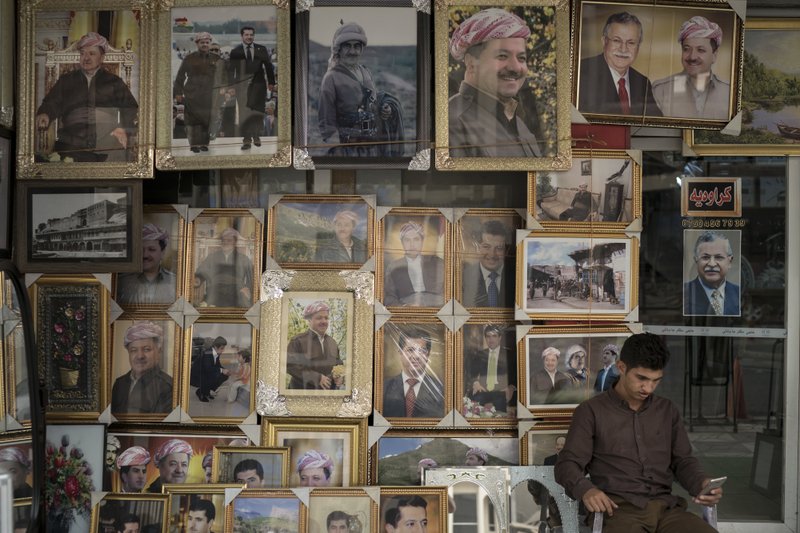BAGHDAD -- Clashes raged in front of Irbil's parliament building after the president of Iraq's autonomous Kurdish region, Masoud Barzani, dissolved his powers as president Sunday just over a month after a controversial independence referendum he spearheaded sparked a deep regional crisis.
An Associated Press team witnessed dozens of protesters attacking the building, parliamentarians and journalists as Barzani addressed the Kurdish region in his first televised speech since the referendum's fallout turned violent earlier this month. Downcast, the longtime Kurdish leader blamed the central government in Baghdad for the regional crisis that followed the independence vote.
"They [Baghdad] used the referendum as an excuse. Their bad intentions were very clear from a long time ago," he said.
"Without the peshmerga the Iraqi army would never have been able to liberate the city of Mosul," he continued, referring to Iraqi Kurdish fighters. "We thought that the international community would reward the peshmerga and the people of Kurdistan in return. They would respect the blood of the martyrs."
Barzani instructed parliament to distribute his presidential powers among the Kurdish prime minister, the parliament and the judiciary. He also informed parliament that he will not seek an extension of his term, which is set to expire Wednesday, but Barzani's senior assistant, Hemin Hawrami, said the move did not mean the Kurdish leader was "stepping down."
Barzani "will stay in Kurdish politics and lead the high political council," but next month he will no longer be president of the region, Hawrami said.
Kurdish presidential elections scheduled to be held next month have been postponed indefinitely. Hawrami added that no political party submitted candidates to run against Barzani.
The referendum on support for independence held in September has since left the region increasingly isolated.
Despite warnings from Baghdad, the United States, Turkey, Iran, the United Nations and others, the vote was held on Sept. 25 in the three provinces that make up the autonomous Kurdish zone as well as in disputed territories claimed by Baghdad, but at the time held by Kurdish forces.
Within weeks, the referendum proved to be extraordinarily costly. The region lost nearly half of the territory that had been comfortably under Kurdish control for years, including the oil-rich city of Kirkuk. The region's airspace was closed to international commercial flights, Turkey threatened the use of military force, and both Iran and Turkey threatened to close border crossings vital to the land-locked region.
In Irbil's bazaar -- where families thronged the streets and fireworks filled the skies during the days leading up to and following the vote -- the mood slowly began to sour earlier this month after Iraqi troops led by Baghdad retook Kirkuk.
"There was no benefit from [the referendum] at all. What can I say?" Abdullah Hassan, an Irbil resident, said inside the bazaar that rings the city's ancient citadel. Hassan said Barzani held the referendum "for his own pride. It was so he could stay in power. What else can it be?"
Barzani's term expired in August 2015, after which he prevented parliament from meeting for two years, a move many of his political opponents saw as a cynical attempt to hold onto power.
As Iraq's military crumbled in the face of Islamic State extremist group advances in 2014, Kurdish forces took control of Kirkuk. Described as the "Jerusalem of Kurdistan" by some of the region's leaders, control of the city and its oil reserves was marked as a significant achievement.
Barzani took over leadership of the Kurdistan Democratic Party in 1979 after the death of his father, Mulla Mustafa Barzani, an iconic guerrilla commander and the party's founder. Barzani became president of the region in 2005 after the 2003 U.S.-led invasion of Iraq.
Earlier this month, Iraqi Prime Minister Haider al-Abadi ordered Iraqi forces into Kirkuk and other disputed areas. The show of force resulted in sporadic clashes that have since ceased as Iraqi and Kurdish commanders continued to negotiate Sunday over a settlement on who would control border crossings with Turkey and Syria in the northwest.
The United States did not initially oppose al-Abadi's military move, saying it supported Iraq's bid to impose federal control over disputed territory. It has since urged Baghdad and Kurdish authorities to set aside hostilities and resume talks on revenue-sharing and borders.
Information for this article was contributed by Susannah George and Salar Salim of The Associated Press; and by Tamer El-Ghobashy of The Washington Post.
A Section on 10/30/2017

